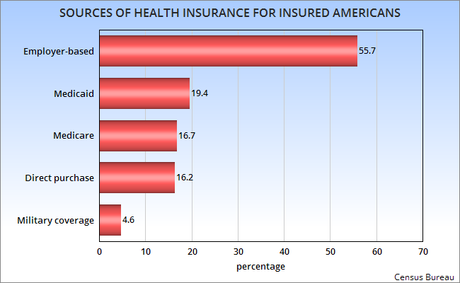 (This chart uses information from the U.S. Census Bureau.)
(This chart uses information from the U.S. Census Bureau.)The media and social networks on the internet are buzzing about Bernie Sanders re-introducing his plan for a single-payer (Medicare For All) health insurance system -- and the fact that at least 16 Democratic senators have signed on as co-sponsors. While that is a small bit of progress toward a single-payer system (which I support), it's not going to happen right now -- and those who think it might are living in a dream world.
Why won't it happen? It's easy to blame congressional Republicans, but that's not the real reason. The real reason is that more than half of all Americans get their insurance through their employer -- and they like that. Until this changes, single-payer will be unachievable. Here is how Jonathan Chait describes the problem in New York Magazine:
The barrier to single payer is that the American health-care system has been built, by accident, around employer-based insurance. The rhetoric of single payer concentrates its moral emphasis on people who lack insurance at all. (“Do we, as a nation, join the rest of the industrialized world and guarantee comprehensive health care to every person as a human right?” writesSanders today.) But the barrier to single-payer health care is the people who already have coverage. Designing a single-payer system means not only covering the uninsured, but financing the cost of moving the 155 million Americans who have employer-based insurance onto Medicare.
That is not a detail to be worked out. It is the entire problem. The impossibility of this barrier is why Lyndon Johnson gave up on trying to pass a universal health-care bill and instead confined his legislation to the elderly (who mostly did not get insurance through employers), and why Barack Obama left the employer-based system intact and created alternate coverage for non-elderly people outside it.
In theory, the transition could be done without hurting anybody. The money workers and their employers pay to insurance companies would be converted into taxes. But this means solving two enormous political obstacles. First, most people who have employer-based coverage like it and don’t want to change. Second, higher taxes are unpopular. Yes, in an imaginary, rational world, people could be reassured that Medicare will be as good as what they have, and the taxes will merely replace the premiums they’re already paying. In reality, people are deeply loss-averse and distrustful of politicians.
Chart is right. There will be no single-payer system until this problem is solved. And it can be solved -- just not all at once by the instituting of a Medicare For All system. It will have to be done in steps, or it won't be done at all.
* The first step is to concentrate on creating a public option for health insurance -- giving Americans the option of choosing Medicare instead of a private insurance plan.
* Do away with Medicaid completely, and enroll those people in Medicare.
* Do away with the Obamacare subsidies for private insurance. Let Americans in Medicare and pay on a sliding scale according to income. Since Medicare is more efficiently managed and doesn't include profits, it would be less expensive even for those at the top of the sliding scale.
* Allow employers to purchase the Medicare option for their employees. This will be less expensive that the private plans, and many small businesses will take that option. As private premiums continue to rise, the larger businesses and corporations will also begin to see this as an opportunity to cover their employees with decent insurance, and save a lot of money for themselves.
* Eventually, most employers will opt for the public option. When that happens, the private insurance companies will have a choice -- go out of business or change to offering Medicare supplement policies.
* At that point, you effectively have a "Medicare For All" single-payer system.
It can be done, but it can only be done in steps -- and the first step must be the creation of a public option for health insurance. Until that is done, "Medicare For All" will just remain a nice, but unattainable dream.

